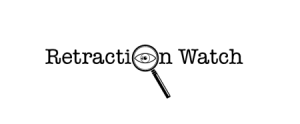 It’s been another exciting year for us at Retraction Watch. As always, there has been more to cover than we have time for. At the same time, we’ve expanded our efforts in other media, telling bigger stories and offering more analysis. And we’ve made major progress on our database — more on that in a moment.
It’s been another exciting year for us at Retraction Watch. As always, there has been more to cover than we have time for. At the same time, we’ve expanded our efforts in other media, telling bigger stories and offering more analysis. And we’ve made major progress on our database — more on that in a moment.
A sampling of what happened this year:
January:
- We launched The Retraction Watch Daily, a digest of our posts from the previous day, and a sneak peek at some of our Weekend Reads. (You haven’t signed up yet? Click here, we’ll wait.)
March:
- We published our 3,000th post.
April:
- Our work was profiled by CBC’s The National.
June/July:
- We helped to organize two meetings on scientific integrity, with Friends of the National Library of Medicine and Colorado State University, and spoke at both meetings.
August:
- We began a partnership with Science, to contribute in-depth investigations and other pieces to their news section. Here’s an example, about a case at Duke involving hundreds of millions of dollars in grants.
October:
- Thanks to the support of the Helmsley Trust, we completed a strategic planning process. Stay tuned in 2017 as we begin to implement parts of the resulting plan.
November:
- We published a piece in Nautilus on fake authorship. We had fun with this one — as did many of the people involved in the phenomenon, which included an fictional character from a hit television show.
And now, a sneak peek at something we know a lot of readers have been eagerly awaiting (as have we!): Our retraction database, being built with the generous support of the MacArthur and Arnold Foundations. It’s still a work in progress; we have a lot more retractions to enter, and we’ll be fixing bugs and adding functionality, but go to retractiondatabase.org for a taste. You can search by country, author, DOI, reason for retraction, journal, and many more criteria. As always, we welcome your feedback.
Now, some numbers:
- Cumulative page views since our launch in August 2010: More than 25 million
- Subscribers to our email alerts: More than 13,000
- Facebook likes: More than 20,000
- Twitter followers: More than 16,000
And the numbers we’re most grateful for: More than 70 individual donors made gifts to The Center For Scientific Integrity, totaling more than $12,000. That unrestricted funding will allow us to grow even more in 2016. It’s not too late to make an end-of-year tax-deductible donation, either. Here’s how.
As we say frequently, but not often enough, we couldn’t have done any of this without our readers — including our critics — and our fantastic, dedicated staff. Thank you, and all the best in 2017!
Like Retraction Watch? Consider making a tax-deductible contribution to support our growth. You can also follow us on Twitter, like us on Facebook, add us to your RSS reader, sign up on our homepage for an email every time there’s a new post, or subscribe to our daily digest. Click here to review our Comments Policy. For a sneak peek at what we’re working on, click here.
Great work on the database! This could be a real game changer. A few remarks/suggestions on the current version:
1) The “reasons for retraction” categories need tweaking. For example there’s a category “Image – Plagiarism/Duplication”, but authors duplicating their own images is not plagiarism; it would make more sense to group this with image manipulation as they often go together. As it stands searching for “plagiarism” returns lots of irrelevant image duplication hits.
2) Some authors appear in the author drop down menu multiple times. E.g. Y Fujii appears as “Fujii, Y.” “Fujii, Yoshitaka” and “Fujii., Y.”
3) When viewing an entry, it would be useful if you could click on an author’s name to see all of their other retractions (if any). Also would it be possible to append the retraction count after each author’s name e.g. Yoshitaka Fujii (150)
Thanks, NS! Great feedback, here are some responses:
1) Agreed that these are a work in progress; will take these comments into account as we tweak.
2) Indeed; this is happening as we make entries, but it will be cleaned up as we go.
3) Stay tuned, that’s planned for the next phase of development.
Will the database have an API? It would be great to have it to make other applications (e.g. a Chrome Extension that flags retracted papers when searching on Google Scholar).
Agreed. Definitely in the plan for a later phase of development — thanks.
Seconded. Yes please REST API.
Ivan, the database is a great idea. Would you consider making the data open? This could be used in so many ways – if you just post the data to somewhere public, people can build APIs and tools around it, and it won’t cost you anything to maintain apart from the data collation.
I have just tried the beta version of the retraction database. It is great and very interesting. Do you have any advice on what scientists should do if they spot ‘errors’ (plagiarism, manipulation etc) in peer reviewed scientific articles? It is very difficult to report. How can scientists ‘whistle blow’ anonymously? Thanks!
Thanks for the comment. You may find this useful.
Is there any platform where a researcher can report plagiarism or fraud and be anonymous?
Yes, PubPeer.